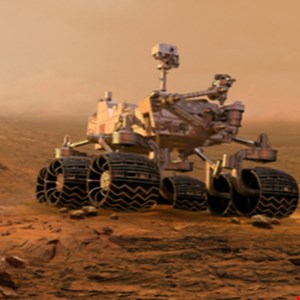#DTX2021: Adapt to Succeed During Times of Great Disruption, Says Astronaut Adam Steltzner

Astronaut Adam Steltzner, NASA JPL, outlined six principles that organizations of all sectors need to embrace in order to navigate significant changes to their environment. His insights can be seen as especially relevant to cybersecurity teams that continue to deal with the digital shift and growing threat landscape during COVID-19.
Speaking during the keynote session on day two of the Digital Transformation EXPO 2021 (DTX) in Excel London, Steltzner explained the enormous challenges he and his team at NASA had to overcome to land the Perseverance land rover on the surface of Mars in February this year. This mission is part of an ongoing journey of discovery about the red planet, principally answering the question as to whether life has ever, or indeed currently, exists there.
NASA also successfully flew the helicopter Ingenuity above the surface of Mars during this mission, despite fears that it would be impossible to fly in a planet that contains atmosphere less than 1% of that of Earth’s.
None of this could be adequately tested on Earth, due to the atmospheric conditions being so far removed from that of Mars. Therefore, the key to ensuring the mission was successful was a willingness to adapt plans, and show “grit” to persevere in all conditions, according to Steltzner. He said that Ingenuity almost didn’t make it to Mars’ surface — the initial plan to fold it into two and be tucked between a pair of wheels had to be changed “late in the development” to ensure it could land safely.
Steltzner then set out lessons he learned from his experience working with Perseverance and Ingenuity, and argued these principles can be applied across all industries.
- 1. Humans are able to adjust to tremendous disruptions: He noted that while humans generally dislike disruptions to the eco-system, they nevertheless are “capable of change.” However, adapting to new landscapes requires significant perseverance and “grit to adjust to the disappointments.” For example, the COVID-19 pandemic forced people throughout the globe to change their plans and miss out on great experiences. The lesson here is that “every tomorrow is not the universe we expect,” and “if we allow ourselves to embrace the truth of where we are, we will be in a much better place to be successful in the actual universe we live in.”
Thankfully, humans are very good at adapting. For example, Steltzner noted that during the pandemic, he “learned to operate spacecraft from my house,” whereas previously he’d be in a control room with 60 colleagues.
- 2. Being successful during disruption requires ingenuity: Steltzner pointed out that in the US, whole sectors of the economy boomed in the pandemic “because people saw the world as it really was and looked for opportunity in that world.” He added: “That’s what it takes to be successful in a pandemic, and what it takes to be successful any time in the future.” In regard to the late changes made to Ingenuity, this was a recognition “of what was working and what wasn’t.” Steltzner said: “That happens all the time in industry and technology – we have to assess what are the new opportunities for us and what can we leverage to be more successful.”
- 3. Sort fact from opinion: Steltzner made the point that in periods of great disruption, “it’s challenging to know what you actually know.” Therefore, it is vital to distinguish facts from opinion. To do so, leaders need to understand the perspectives of the different teams within their organization. “It’s my job to look across their siloed perspectives and find a tempered, balanced perspective with which to lead the team.”
- 4. Humans succeed as teams: “As individuals we might have a great idea, to succeed we have to come together in groups we call teams,” outlined Steltzner. He said the strength of a particular product is always a result of the strength of the teamwork that went into creating it. “You want everybody on your team contributing the most of themselves that they possibly can,” he added, stating it is the responsibility of leaders to establish an environment in which everyone enjoys themselves — “a supercharged, collaborative, lovefest!” as he put it.
- 5. Talk less, listen more: Steltzner said this principle is particularly vital in the current world, which is more virtual and distant. “To really get the most from my team, I need to make the space in the room for their contributions to come out,” he said, adding that he realized he needed to “talk less” to ensure this was the case.
- 6. Be curious: Steltzner pointed out that everyone enters the world as babies essentially “unprogrammed,” and it’s that child-like curiosity that enables us to learn how to navigate the environment we reside in. However, as humans get older, “we start expecting that tomorrow is going to be the tomorrow we thought it would be, and we stop looking to see the tomorrow as it really is.” This mindsight leads to lost opportunities, according to Steltzner, and it is therefore important that “we keep our minds curious like a child’s, as we will be more agile and more innovative.”
Steltzner concluded by stating: “If we take that [curiosity] and combine it with a culture of a team and weather the hardships that we might face in the future, there’s almost nothing a team of individuals can’t do.”

